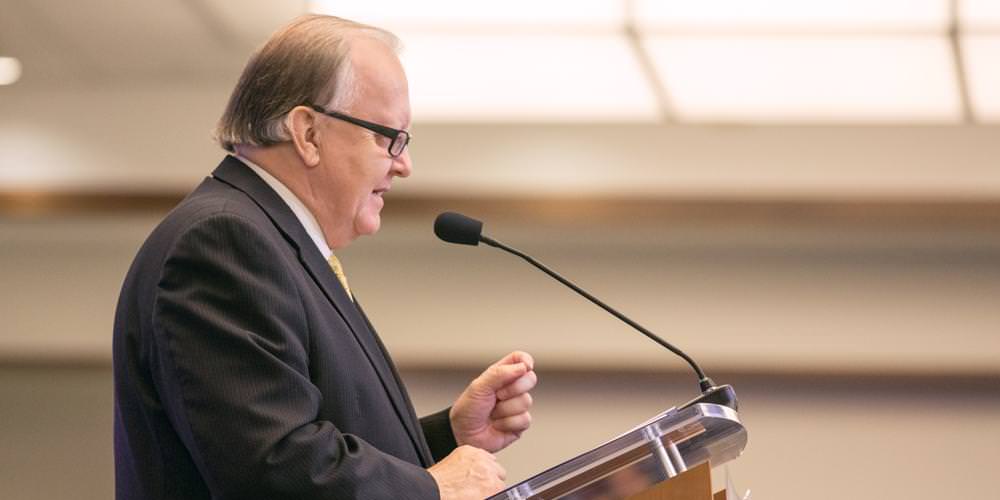North American Division president challenges Year-End Meeting attendees

During the main worship service Daniel R. Jackson, president of the Seventh-day Adventist Church in North America (NAD), said “[Our Church] can become meaningless in the world if we don’t learn how to reach the people of our territory. Words can be empty and meaningless if they don’t have action behind them.”
Jackson, preaching a sermon entitled “Words,” declared to the delegates, families, and guests attending the 2017 North American Division Year-End Meeting Sabbath program that “God is waiting for a demonstration. He says to you and me ‘I don’t really care that much about your words.’” Jackson shared God’s admonitions in Malachi, where God tells Israel He is tired of their words.
“Love,” said Jackson, “becomes the basis of service to God. [Today] He is calling on you and me to demonstrate His love.”
The Sabbath service is part of the meetings taking place at the new headquarters of the North American Division, inaugurated on Thursday, October 26.
The sermon expanded on the theme of this year’s NAD Year-End Meeting, “New Perspectives.” Jackson explained that “Serving and working for God today may take us to places and draw us into circumstances that are anything but acceptable and comfortable — it may require more humility than ever before — but nevertheless, these circumstances are reality.”
Before Jackson began, G. Alexander Bryant, executive secretary of the NAD, made a stirring introduction as he drew an analogy to the biblical King David.
“David was the most unlikely [king] from human perspective. But while the people were questioning, God was shaping and molding him,” said Bryant. “His assignment: protect the sheep. His title: Shepherd Boy. His challenge: the bear, the lion, and Goliath.”
Bryant went on to state that for more than 100 years, leaders in North America asked for their own headquarters in order to lead the work in their territory.
“But while all this was going on God was preparing a man out on the plains of Canada. The assignment: ‘Go and lead the North American Division.’ God has called this man to lead this division, to do what everyone said was impossible.”
“We are called by God to plant ourselves in the soil of human need — as different and as difficult and as hard as the soil may be today,” said Jackson.
“We settle for words in religion because deeds are too costly.”
“People around us are dying in the streets. People are losing their souls, and we are arguing about how many angels can fit on the head of a pin. If we aren’t going to follow our words with actions, we should shut up,” admonished Jackson.
“So where does love call us?” asked Jackson. “We will never discover the answer to that nor the true basis for effective Christ-centered ministry with more seminars, with better personal coaches, or mentors, or by looking to others.”
The answer, Jackson said, is found in the Apostle Paul’s words in Hebrews 12:1,2: “Let us run with perseverance the race marked out of us, fixing our eyes on Jesus, the pioneer and perfecter of faith” (NIV).
In other words, Jackson said, “the best way for me to understand my life and my service for God is to keep my eyes fixed upon Jesus as my Example and my Mentor.”
Jackson quoted A. W. Tozer, a prolific Christian commentator on how modern Christians are “long on talk and short on conduct. We settle for words in religion because deeds are too costly. It is easier to pray, ‘Lord help me to carry my cross daily’ then to pick up the cross and carry it.”
Jackson said as we carry the cross it must include a willingness to develop new approaches, to “adapt to new ways of thinking, communicating, and implementing the mandates of our Lord.” It also includes becoming passionate about service, and being willing to “risk all for Christ’s sake — even if it means abusive treatment and rejection.” Jackson said we should use our time, talents, and resources for Him.
And using the analogy of the Choluteca Bridge — to nowhere — in Honduras, Jackson warned that we must be able to adapt as the world changes, using words people can understand—and backing up those words with action. He referenced how technology has changed the way people live, learn, and communicate, saying “We are no longer keepers of the knowledge; we must become the facilitators of learning.”
Near the sermon’s end, Jackson related his experience reading a book on Geronimo, the leader of the Chiricahua Apache tribe and lessons we can learn from his life experience. Geronimo dreamed of having the Chiricahua people living in their homeland in Arizona.
“There was a tenacity to the man,” said Jackson. “An unwillingness to give up his dream even if he was shot, hunted like a dog, imprisoned, and betrayed. While he and his people were forever banished from their land—he never gave up hope—he never quit trying.”
Said Jackson, “We need to ask Jesus to complete His work in our life.” He told the audience, who stood near the end of his sermon, that we need Jesus to “complete the work in our life — do what needs to be done because we can’t do it ourselves.”
Jackson concluded by reminding those gathered that “Everyone in this auditorium is a minister of the most high God.”








